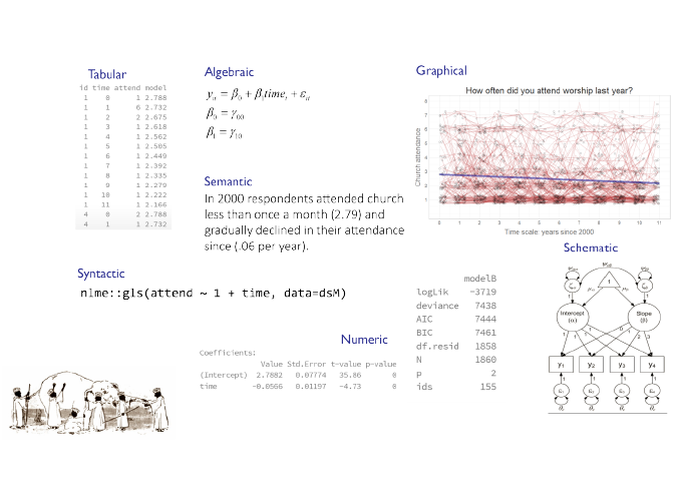I am a data scientist with background in quantitative methods and interest in data-driven models of human aging.
I received my Ph.D. in Quantitative Methods in 2014 from Vanderbilt University, where I studied under Dr. Joe Rodgers, specializing in statistical modeling, design of graphical displays of information, and reproducible research. In August of the same year I joined the Integrative Analysis of Longitudinal Studies of Aging (IALSA) network (NIH/NIA P01AG043362) at the University of Victoria (UVic), directed by Dr. Andrea Piccinin and Dr. Scott Hofer. With IALSA, I worked on developing reproducible analytics (R + GitHub) for remote collaboration, particularly for implementing coordinated statistical analyses among multiple longitudinal studies of aging via remote participation.
Interest in data-driven narratives of human aging lead me to explore the use of electronic health records (EHR) for research and improvement of patient care. Since October 2015 I have been working with Dr. Kenneth Moselle, the director of the Applied Clinical Research Unit (ACRU) of Vancouver Island Health Authority (VIHA) on curating the transformation of VIHA’s EHR into analyzable form and creating opportunities for academic and clinical researchers to work with these data in responsible and reproducible way. Together with Dr. Moselle I have launched a Data Science Studio at the University of Victoria, a research unit at the Institute on Aging and Lifelong Health dedicated to supporting its research affiliates and UVic students in accessing, handling, and modeling cross-continuum health records of VIHA.
At ACRU I worked on bridging healthcare data to analytic capacities of longitudinal modelling. My functions at ACRU included statistical and programming support for research and quality improvement projects, coordinating communication and empowering collaboration among three audiences: database managers, medical practitioners, and academic researchers. The overlap in my skills in statistical modeling, programming, and knowledge of VIHA’s electronic health records gave me a unique advantage to facilitate such a collaboration, the integrative nature of which offered great promises for improving patient care, medical science, and methodological practices of longitudinal research.
In August of 2017 I was awarded a CIHR Health System Impact Fellowship with BC Observatory for Population and Public Health of the BC Centre for Disease Control ($140,000 + $15,000 development fund). My program of work involved developing a system for population health surveillance that would focus on chronic diseases, with particular focus on mental health and substance use (MHSU) conditions, which tend to have high comorbidity rates, polysubstance use patterns, and slowly progressing pace of development. Drawing on my experience with EHR system employed by VIHA, I engaged various statistical modeling and learning techniques to construct analytic workflows capable of supporting clinical decisions at the point of service, while translating the acquired knowledge to be consumed by clinical stewards, system planners, and surveillance agencies.
mindset
Data scientists describe the ultimate reality about data using various dialets of expression. Each translation has its benefits and disadvantages. We need them all to tell a good story.

No one language is better than the other. Each allows for different shades of distinction in model specification.

